Parramatta Eels are not playing for each other and Brad Arthur must find the solution
THERE are clear problems at Parramatta. The Eels are not playing for each other. Maybe they should be out on the drink, because that might break the disconnect among the players, writes PAUL KENT.
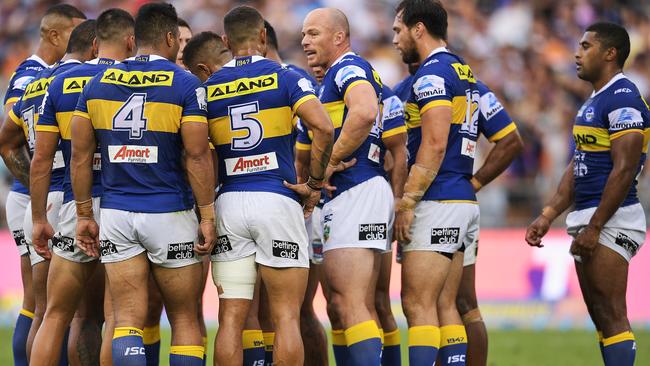
Opinion
Don't miss out on the headlines from Opinion. Followed categories will be added to My News.
SO the Parramatta players were not out on the drink, as suggested. Maybe they should have been.
There is no simple explain-all for players drinking.
You can argue that few of the athletes currently at the Commonwealth Games on the Gold Coast would have been out on a bender four, five even six days before their event, aware a binge drink does not lend itself to peak performance.
They are not going to blow an opportunity it will take fours years to get again for a night out and a few giggles.
At the same time, they can provide benefit.
UPDATED: NRL teams for round 5
PITIFUL: ‘Ill-disciplined’ Eels at lowest ebb
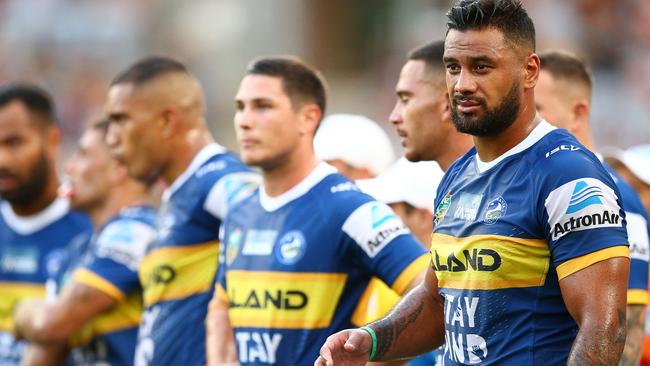
The bonding at State of Origin camps, for example, once served a legitimate purpose.
Players came in from opposing teams and often didn’t know each other and a few beers around a table broke down barriers.
When Canterbury got torn apart early in the 1995 season the club was as volatile as it has ever been.
It is hard to describe the depth of venom at the time. With the Bulldogs and around the League as Super League broke and clubs quickly aligned themselves with one competition or the other.
Coaches, players and officials were fighting for what they believed at the time would be their livelihood. Early on, everybody believed only one competition would survive.
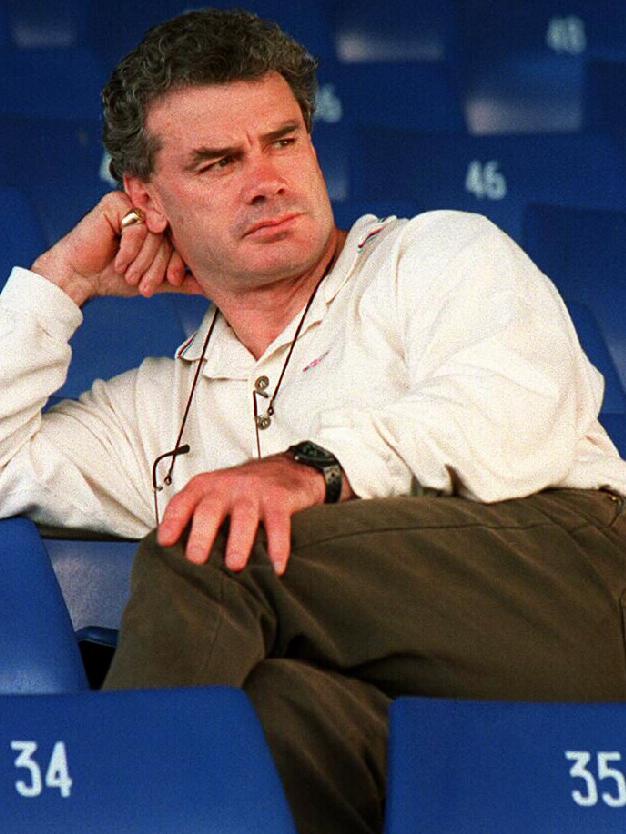
Coach Chris Anderson had to deal with his club signing with Super League while four of his best players, all Origin or Test stars, signed with the rival Australian Rugby League.
Anderson kicked a chair across the room the night the four — Dean Pay, Jason Smith, Jim Dymock and Jarrod McCracken — called him into a room at the Leagues Club and told him they flipped.
The Bulldogs lost their next three games and a season of promise was now promising to go south.
Anderson believed he had one option left, and an honesty session followed.
Anderson called all the players together and they sat down with a few beers, the single rule being that nobody left until their issues were resolved.
As the night wore on they could all feel the mood within the room change. Frowns gave way to smiles and smiles gave way to laughs.
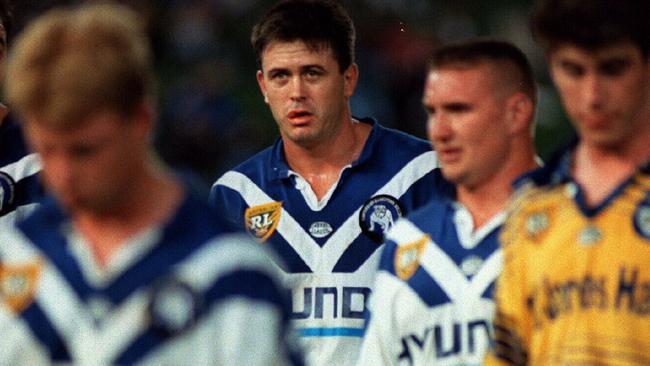
It went well into the night before they all found common ground, but they found it.
The bond was back.
Every Monday afternoon for the rest of the season the Bulldogs were ordered to meet at a pub, even if they sat on orange juice, and they could talk about anything they wanted except football.
The Bulldogs recovered from their slow start and became the first club to win the premiership from outside the four.
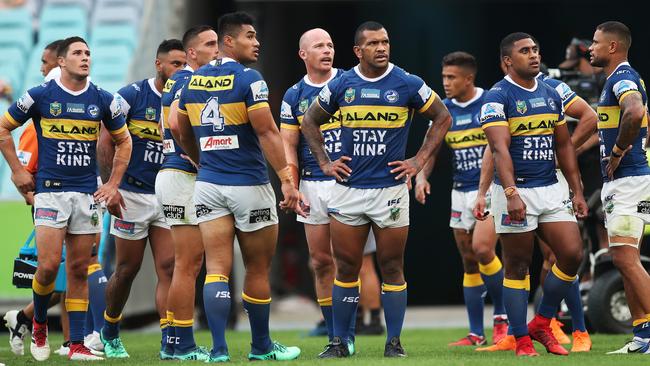
There are clear problems at Parramatta.
Certainly not to the depth there was at Canterbury all those years ago and to what extent nobody is certain.
The good news, then, is that it is more easily fixable.
Coach Brad Arthur might have his ideas what is wrong like captain Tim Mannah might have his and playmakers Mitchell Moses and Corey Norman might have theirs, but until the Eels get winning nobody can be certain what it is.
It is clear there is a disconnect among the playing group. They might not even realise it.
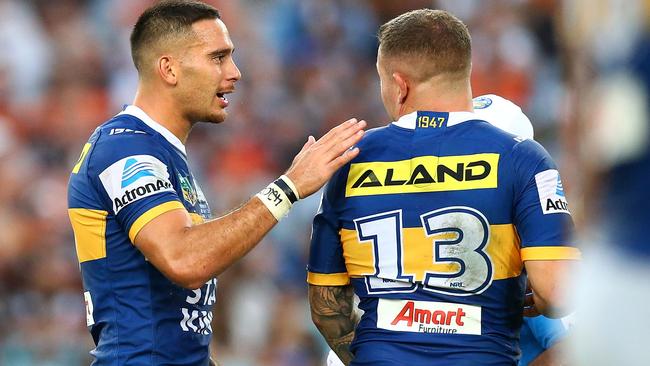
Nine minutes into the second half against Wests Tigers on Monday Kenny Edwards is tackled and scrambling to his feet and Mitch Moses is screaming at him.
“Get up,” Moses screams, followed by two expletives that failed to pass the censors.
The Eels are not playing for each other.
Four minutes later the Eels attack down the Tigers right edge and turn the ball over.
Tui Lolohea picks it up and heads back downfield.
What happened next was small and often overlooked and it cuts to what is wrong at Parramatta.
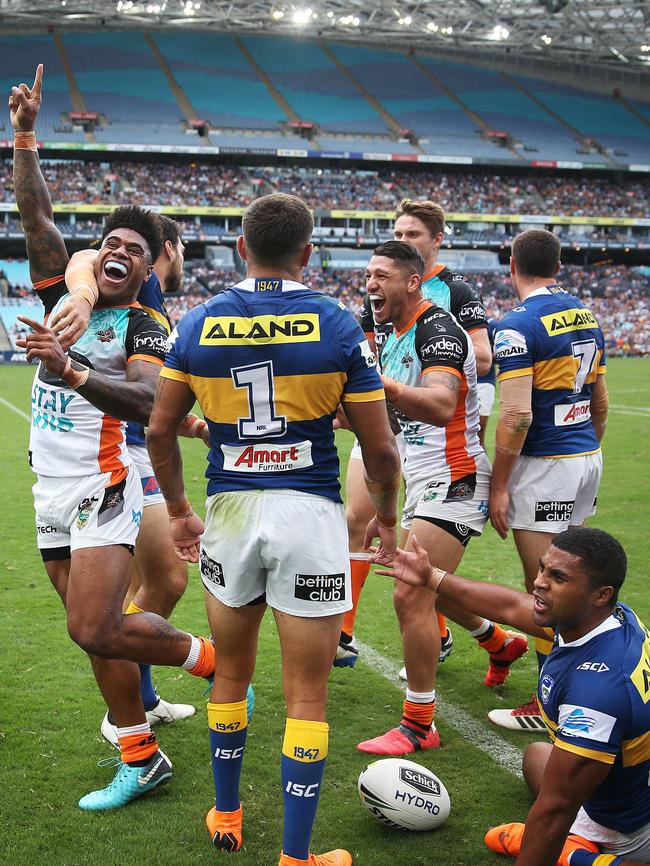
Tackle one, Parramatta has five players defending between the sideline and the 10m scrumline.
With two at marker, another at fullback, it leaves just five players to defend the rest of the field.
They are small instances that speak of bigger problems.
One of the great buzzwords in the game today is “transition”. How quickly teams transition from defence to attack or back again.
It speaks of organisation and understanding and a little thing called desire.
Under defensive pressure after a turnover the Eels were lazy in defence and failed to help their teammate.
The Tigers spun the ball wide, Benji Marshall stepped and shimmied and 50m later Corey Thompson was scoring in the corner.
The Tigers transitioned quickly and caught the Eels short.
Figure out how to fix that and the Eels will go a long way towards fixing four losses from their opening four games.
Here’s cheers.



